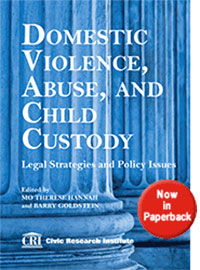The book brings together all of the most important research about custody and domestic violence in one place so that professionals and protective mothers can find the information they need. This is especially helpful in supporting domestic violence custody cases.
The book demonstrates that there is a serious problem with the way custody courts respond to domestic violence. The courts are getting a large majority of these cases wrong and often catastrophically so. One of the big problems is that courts first developed practices to respond to domestic violence at a time when no research was available. At the time there was a popular assumption that domestic violence was caused by mental illness, substance abuse and the actions of the victim. This led courts to rely on mental health professionals as if they were the experts. We now have substantial research that demonstrates these assumptions were wrong and the standard practices are outdated and discredited. Evaluators routinely use psychological tests that were not made for the populations seen in Family Courts and are based on probability assumptions that often don’t apply to the individual parties. This often results in safe, protective mothers being pathologized. The problem is exacerbated by a cottage industry of psychologists and lawyers who recognize that most contested custody are domestic violence cases and the abuser usually controls the family finances. This means the best way to make large incomes is to support approaches that favor abusers. Courts routinely treat these biased professionals as if they were neutral. Even worse many courts learn misinformation from the cottage industry and repeat it in other cases. Although there is now a substantial body of scientific research that could inform decisions and better protect children, few courts have started looking to this research in order to improve their response to domestic violence. In many cases court professionals discredit true allegations of abuse based on information that is not probative and then fail to look for the patterns of coercive and controlling behaviors that would help them recognize domestic violence. In many of the worst cases the courts use bad practices to deny true allegations of abuse and then punish mothers for trying to protect their children from dangerous abusers. This book provides the information necessary to challenge these faulty practices.
 We will soon be publishing a new book co-edited with Dr. Mo Therese Hannah. The book is called Preventing Domestic Violence and Child Abuse: Medical, Law Enforcement, Judicial and Human Benefits. It is based on our belief that the ACE (adverse childhood experiences) Studies offer a similar opportunity to the 1964 Surgeon General’s Report linking smoking and cancer. ACE tells us that exposure to DV and child abuse causes cancer, heart disease, and many other health and social problems. Many different parts of society helped discourage smoking and in doing so saved millions of lives and trillions of dollars. Preventing DV and child abuse offers the same opportunity. We spoke with the American Cancer Society, American Heart Association, and the CDC about their work to prevent smoking and their work to reduce DV and child abuse. We believe courts and legislators would be more likely to listen to the research that supports protective mothers if the information is coming from these highly respected organizations.
We will soon be publishing a new book co-edited with Dr. Mo Therese Hannah. The book is called Preventing Domestic Violence and Child Abuse: Medical, Law Enforcement, Judicial and Human Benefits. It is based on our belief that the ACE (adverse childhood experiences) Studies offer a similar opportunity to the 1964 Surgeon General’s Report linking smoking and cancer. ACE tells us that exposure to DV and child abuse causes cancer, heart disease, and many other health and social problems. Many different parts of society helped discourage smoking and in doing so saved millions of lives and trillions of dollars. Preventing DV and child abuse offers the same opportunity. We spoke with the American Cancer Society, American Heart Association, and the CDC about their work to prevent smoking and their work to reduce DV and child abuse. We believe courts and legislators would be more likely to listen to the research that supports protective mothers if the information is coming from these highly respected organizations.